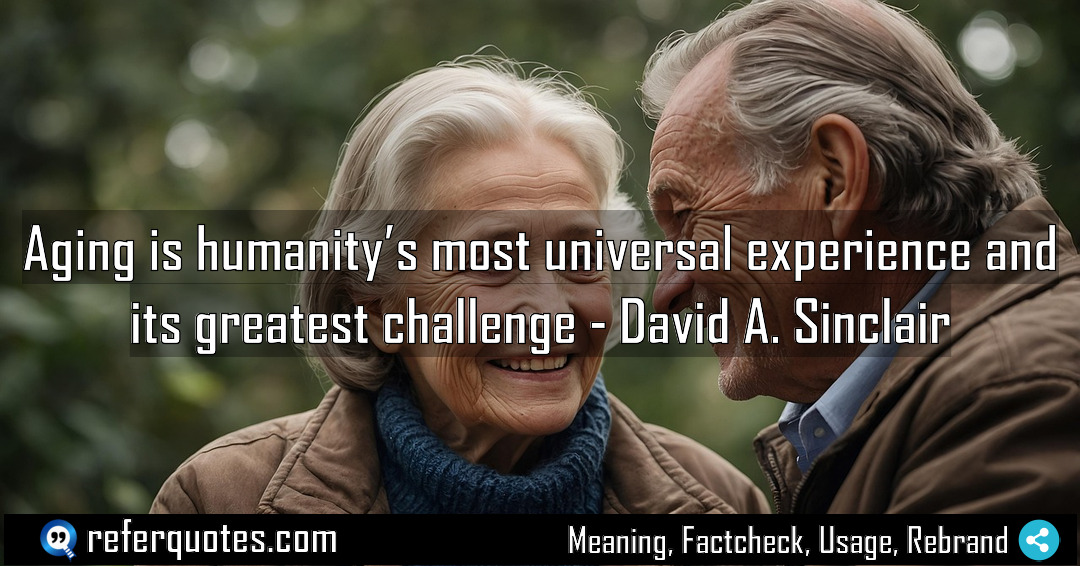
You know, when David Sinclair says “Aging is humanity’s most universal experience,” he’s really hitting on something profound. It’s the one journey we all share, and he frames it not as a passive decline but as our greatest collective challenge—a problem we can actually solve.
Share Image Quote:
Table of Contents
- Meaning
- Explanation
- Origin & Factcheck
- Context
- Usage Examples
- FAQ
Meaning
At its core, this quote reframes aging. It’s not just a biological fact; it’s a universal human bond and, more importantly, a solvable problem.
Explanation
Let’s break this down. The “most universal experience” part is key. Think about it. Every single person, regardless of where they’re from or what they believe, is on this exact same clock. We’re all getting older. It’s the ultimate common ground. But here’s where Sinclair flips the script. He calls it our “greatest challenge.” And that’s the real punchline. He’s not talking about the challenge of enduring old age. He’s talking about the challenge of defeating it. He sees aging not as a fixed, inevitable sunset but as a malleable process—a disease, in a way, that we can treat and potentially reverse. It’s a call to action. It’s saying, “We’ve all been putting up with this for millennia. Maybe we don’t have to.”
Quote Summary
Reading Level80
Aesthetic Score80
Origin & Factcheck
This comes straight from the introduction of David Sinclair’s 2019 book, Lifespan: Why We Age—and Why We Don’t Have To. You’ll sometimes see the sentiment echoed elsewhere, but this specific, powerful phrasing is Sinclair’s. He’s a professor of genetics at Harvard Medical School, so this isn’t just pop-sci fluff; it’s the thesis of a leading researcher.
Attribution Summary
Where is this quotation located?
| Quotation | Aging is humanity’s most universal experience and its greatest challenge |
| Book Details | Publication Year: 2019; ISBN: 978-1501191978; Last edition: 2020; Number of pages: 432. |
| Where is it? | Chapter 1: A Grandmother’s Genes, Approximate page 33 from 2019 edition |
Context
In the book, this quote sets the stage for his entire argument. He lays out this universal problem and then spends the rest of the pages explaining the science of epigenetics and information theory of aging, arguing that we are on the cusp of being able to intervene. He’s not just observing a problem; he’s proposing a solution.
Usage Examples
I find this quote is incredibly versatile. You can use it to:
- Frame a conversation about longevity science: When talking to a curious friend, start with this. It immediately shifts the discussion from sci-fi fantasy to a tangible human endeavor.
- Motivate a team in biotech or health: For an audience of researchers or developers, this quote is a rallying cry. It reminds them that their work tackles the most fundamental human condition.
- Challenge fatalistic thinking: Use it with someone who just accepts aging as “the way it is.” It gently introduces the radical idea that maybe, just maybe, it doesn’t have to be.
To whom it appeals?
Share This Quote Image & Motivate
Motivation Score78
Popularity Score78
Shareability Score80
FAQ
Question: Is Sinclair saying we can achieve immortality?
Answer: Not at all. His focus is on “healthspan”—extending the number of years we live in good health. The goal is to compress the period of sickness at the end of life, not to live forever.
Question: So, is aging really a “disease”?
Answer: That’s the core of his argument. He and a growing number of scientists view aging as the root cause of most major diseases (cancer, dementia, heart disease). By treating aging itself, you could potentially prevent all of them at once.
Question: This sounds expensive. Wouldn’t this only be for the wealthy?
Answer: It’s a valid concern. Sinclair addresses this, arguing that the societal cost of not tackling aging—trillions in healthcare for chronic diseases—is far greater. The goal is to make interventions accessible, but it’s a major ethical hurdle for the field.
Similar Quotes
Aging will be remembered as a condition we once accepted… but what if it’s not inevitable? David Sinclair reframes aging from a fact of life into a solvable problem, a…
We don’t have to accept aging as inevitable. It’s a radical shift from thinking we’re just passengers on the aging train to realizing we might be the engineers. This quote…
To slow aging, we must first change our minds. It’s a profound shift from seeing aging as an inevitable decline to viewing it as a malleable process we can influence.…
You know, when David Sinclair says “Aging will change the world more than any technology,” he’s pointing to a seismic shift. It’s not about gadgets, but about the fundamental restructuring…
To cure aging, we must first believe it’s possible… and that belief is the very first domino that needs to fall. It’s not just a feel-good statement; it’s the foundational…
